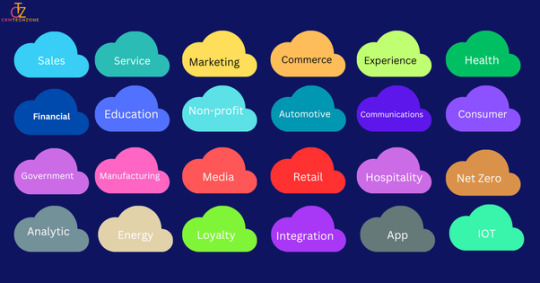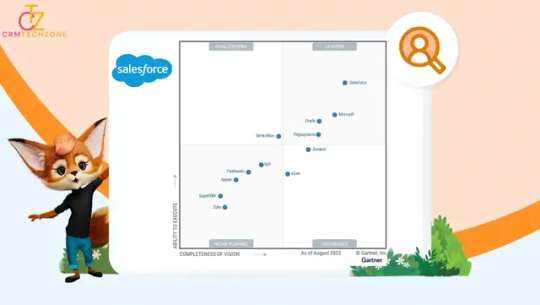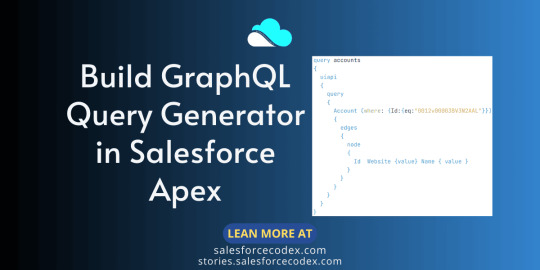Don't wanna be here? Send us removal request.
Text
youtube
#salesforce#salesforce development services#salesforce development company#salesforce certified consultants#salesforce automation company#salesforce development agency#salesforcecodex#development#salesforce automation services#salesforce partner company#Youtube
1 note
·
View note
Text
📢 Master Salesforce Data Modeling – First Step for Data Architect Certification! 🚀
Are you preparing for the Salesforce Data Architect Certification? Understanding Data Modeling is crucial for designing scalable and efficient Salesforce solutions.
In this video, we cover: ✅ Objects, Fields, and Relationships ✅ Standard vs. Custom Objects ✅ Lookup vs. Master-Detail Relationships ✅ Schema Builder & Best Practices
🎥 Watch Now: https://youtu.be/Lq6SAD8dIS0
📌 If you're a Salesforce Admin, Developer, or Architect, this video is for you! Let’s discuss – what are your biggest challenges with Data Modeling? Drop your thoughts in the comments! 👇
🔔 Don’t forget to Like, Share & Subscribe to SalesforceCodex for more expert Salesforce content! 🚀
#Salesforce #SalesforceDataArchitect #SalesforceCertification #DataModeling #SalesforceAdmin #SalesforceDeveloper #CRM #SalesforceBestPractices
#salesforce#salesforce development services#salesforce development company#salesforce certified consultants#salesforce automation company#salesforce partner company#salesforce automation services#salesforce development agency#salesforcecodex#development
0 notes
Text
🚀 Elevate Your Career to Salesforce Architect! 🛠️
Are you a Salesforce professional aiming to take your career to the next level? Transitioning to a Salesforce Architect is a game-changer! 🌟
In our latest blog on SalesforceCodex, we dive deep into the key steps, skills, and strategies you need to elevate your career. From mastering technical expertise to developing leadership qualities, this guide covers everything you need to know to become a successful Salesforce Architect.
👉 Read the full blog here!
#Salesforce #SalesforceArchitect #CareerGrowth #SalesforceCodex #CloudSolutions #TechLeadership
#salesforce#salesforce development services#development#salesforce development company#salesforce automation company#salesforce partner company#salesforce automation services#salesforce development agency#salesforce certified consultants#salesforcecodex
0 notes
Text
Salesforce CRM implementation involves careful planning, strategic execution, and continual optimization to achieve successful uptake and utilization throughout your organization.
#salesforce#salesforce development services#salesforce development company#appexchange services#salesforce automation company#salesforce certified consultants#appexchange company#salesforce automation services#development#salesforce development agency#salesforcecodex#salesforce api integration company#salesforce api integration services#salesforce consulting company#salesforce partner company#salesforce consulting services#salesforce crm company#salesforce implementation company#salesforce implementation services
1 note
·
View note
Text
Salesforce’s Dynamic Formula Evaluation (DEF) is a powerful feature that evaluates formula expressions at runtime based on the context in which they are executed. This capability increases formulas��� flexibility and applicability across various Salesforce scenarios, such as Flows, Validation Rules, and Apex code.
#salesforce#salesforce partner company#salesforce implementation services#salesforce consulting services#salesforce certified consultants#salesforce consulting company#salesforce crm company#salesforce development agency#salesforce automation company
1 note
·
View note
Text
Salesforce released many important features in the Summer ’24 release. We have highlighted the top 5 Salesforce Apex features of the Salesforce Summer’24 release in this post. These features also help AppExchange app developer’s more control over code at runtime.
#salesforce#salesforcecodex#salesforce development services#salesforce development company#salesforce development agency#salesforce partner company#salesforce implementation company
1 note
·
View note
Text
Vagmine Cloud Solution provides specialized consultants to assist your businesses in maximizing the value and effectiveness of their Salesforce platform. These services are designed to help organizations optimize their Salesforce implementation, streamline their business processes, and achieve their unique business goals
#salesforce#salesforce development services#salesforce development company#appexchange company#development#salesforce certified consultants
1 note
·
View note
Text
Exploring the 24 Types of Salesforce Clouds and Their Key Features
Salesforce continues to be a leader in providing innovative solutions tailored to meet the diverse needs of businesses across various industries. From Sales Cloud to Industry-Specific Clouds, Salesforce offers a plethora of tools designed to streamline operations, enhance customer relationships, and drive business growth.

In an insightful guide from CRM Tech Zone, you can delve into the 24 Types of Salesforce Clouds and Their Key Features. This comprehensive article breaks down each cloud service offered by Salesforce, highlighting the unique features that make them indispensable for different sectors. Whether you're in healthcare, finance, retail, or any other industry, Salesforce has a specialized cloud to address your specific challenges and opportunities.
Key Highlights from the Guide
Sales Cloud: Focuses on sales automation, lead management, and opportunity tracking to boost sales productivity.
Service Cloud: Enhances customer service through case management, knowledge bases, and omni-channel support.
Marketing Cloud: Provides tools for email marketing, social media engagement, and personalized customer journeys.
Commerce Cloud: Delivers seamless e-commerce experiences with order management and AI-driven personalization.
Experience Cloud: Enables the creation of branded communities and portals for customers, partners, and employees.
IoT Cloud: Connects and processes data from IoT devices for real-time insights and automation.
Industry-Specific Clouds: Including Health Cloud, Financial Services Cloud, Education Cloud, and more, these tailored solutions address industry-specific needs and regulatory requirements.
The article also explores newer additions like Automotive Cloud, Communications Cloud, Consumer Goods Cloud, Government Cloud, Manufacturing Cloud, Media Cloud, Retail Cloud, and Transportation & Hospitality Cloud, each designed to offer specialized features for distinct industry requirements.
Why You Should Read This Guide
Understanding the full spectrum of Salesforce clouds can empower your business to leverage the right tools for optimal results. Whether you're looking to improve customer engagement, streamline operations, or harness the power of AI and IoT, this guide offers valuable insights into how Salesforce's comprehensive suite of clouds can help you achieve your business goals.
Read the full guide on CRM Tech Zone to explore detailed descriptions and features of each Salesforce cloud, and discover how they can transform your business operations and strategy.
Link to the guide: 24 Types of Salesforce Clouds and Their Key Features
#salesforce#salesforcecodex#salesforce development services#salesforce development company#salesforce automation company#salesforce certified consultants#salesforce automation services
1 note
·
View note
Text
GraphQL in Lightning Web Component
GraphQL is a query language and API runtime developed by Facebook that allows for more efficient data retrieval for apps. Unlike standard REST APIs, which provide clients with preset data formats, GraphQL allows customers to request only the data they require. It offers a more flexible, efficient, and powerful method of retrieving data from servers.
GraphQL's key characteristics include:
Hierarchical Structure: Clients determine the form of the data they require, and they receive data in the exact shape requested, reducing data over-fetching or under-fetching.
Single Endpoint: GraphQL APIs, unlike REST APIs, often have a single endpoint, simplifying API calls.
Strong Typing System: To describe the API schema, GraphQL employs a type system. Clients can examine this schema to learn about the API's capabilities and data types.
Batching and Caching: GraphQL allows numerous queries to be batched into a single request, minimising the expense of multiple network requests. Furthermore, because queries are explicit, caching techniques can be fine-tuned.
Real-time Data: GraphQL offers real-time data with subscriptions, allowing clients to receive updates when specified data on the server changes.
Backward Compatibility: Due to the nature of explicit queries, adding new fields or capabilities to a GraphQL API often does not affect existing clients.
We can use GraphQL in Lightning Web Component and Salesforce Apex similar to other programming languages.
Check out below posts to understand GraphQL in Salesforce
LWC (Lightning Web Component)
Displaying Tabular Data with GraphQL in Lightning Web Component
Apex
Exploring GraphQL API in Salesforce
GraphQL Query Generator in Salesforce Apex
#salesforce#salesforce development services#salesforcecodex#salesforce development company#crm services#salesforce development agency#salesforce consulting company#salesforce certified consultants#salesforce automation company#salesforce consulting services#salesforce partner company#salesforce implementation services#salesforce implementation company#salesforce automation services
0 notes
Text
Salesforce Recognized Leader in Gartner Magic Quadrant for CRM Customer Engagement Center
Salesforce Service Cloud has been awarded a leader in the Gartner Magic Quadrant for CRM Customer Engagement Centre report for 2023. This is 14th consecutive year for Salesforce to be recognized as a leader. Gartner named Salesforce’s Service Cloud a Leader in terms of both vision and execution.
According to Gartner, CRM Customer Engagement Center is used to describe software solutions that are used to engage customers intelligently, both proactively and reactively, by providing advice, addressing problems, and responding to inquiries.
Check out complete news at Salesforce Recognized Leader in Gartner Magic Quadrant for CRM Customer Engagement Center
#salesforce#salesforcecodex#salesforce development services#salesforce development company#crm services#development
0 notes
Text
Salesforce Recognized Leader in Gartner Magic Quadrant for CRM Customer Engagement Center
Salesforce Service Cloud has been awarded a leader in the Gartner Magic Quadrant for CRM Customer Engagement Centre report for 2023. This is 14th consecutive year for Salesforce to be recognized as a leader. Gartner named Salesforce’s Service Cloud a Leader in terms of both vision and execution.

According to Gartner, CRM Customer Engagement Center is used to describe software solutions that are used to engage customers intelligently, both proactively and reactively, by providing advice, addressing problems, and responding to inquiries.
Check out complete news at Salesforce Recognized Leader in Gartner Magic Quadrant for CRM Customer Engagement Center
#salesforce#salesforcecodex#salesforce development services#salesforce development company#crm services#development
0 notes
Text
Dynamically Instantiate Components in LWC
We include many modules in the Lightning Web component to accomplish business requirements. These modules can take a longer time when the component is loaded on the page. This can lead to a performance issue on the Salesforce record page. Dynamic component instantiation can help us avoid loading huge modules. We can also instantiate a component instance even if the underlying component constructor isn’t known until runtime. Dynamic import is an easy way to make a component more adaptable.

Steps for dynamic instantiation are as below
Enable LWC for Dynamic Instantiate
Using Dynamic Component
Check out the complete details here Dynamically Instantiate Components in LWC
0 notes
Text
Generate GraphQL Query In Salesforce Apex
GraphQL can retrieve data from multiple sources in a single query. This will reduce the number of HTTP requests, reducing latency and boosting performance, particularly in mobile and low-bandwidth devices. To retrieve data we have to create SQOL in GraphQL format. In this post, we will build a GraphQL Query Generator in Salesforce Apex that will give us a valid GraphQL query. We will also use generated SOQL to retrieve data using GraphQL API.
To explore GraphQL in Salesforce you can check our other post Exploring GraphQL API in Salesforce.
Steps to create a GraphQL query generator
Create Apex Classes for Query Generator
Use Generate GraphQL Query to retrieve data

Check out post GraphQL Query Generator in Salesforce Apex to learn each step in detail.
#salesforce#salesforce development services#salesforce development company#development#salesforcecodex#rest api#graphql
0 notes
Text
How To Become a Salesforce Consultant?
A Salesforce consultant is an expert who advises and consults firms on Salesforce system deployment, customization, and optimisation. They work closely with clients to completely understand their company objectives, procedures, and goals, and then create and configure Salesforce to suit those demands effectively.

Skills Required to Become Salesforce Consultant
Gain a solid understanding of Salesforce
Obtain Salesforce certifications
Acquire practical experience
Develop your consulting skills
Network within the Salesforce community
Look for employment or freelance opportunities
Continuously learn and stay updated
Salesforce consultant acts as a trusted advisor to customers, assisting them in realizing the full potential of Salesforce to optimize operations, improve customer experiences, and achieve corporate goals.
#salesforce #salesforceadmin
#salesforce#salesforcecodex#salesforce development services#salesforce development company#development
1 note
·
View note
Text
Salesforce DevOps for Developers
Salesforce DevOps is essential for organizations using the Salesforce platform because it enables efficient and collaborative development, seamless deployment, and effective management of Salesforce applications.
Here are some key reasons why Salesforce DevOps is important:
Collaboration: Salesforce DevOps promotes collaboration among developers, administrators, and stakeholders involved in the application development and deployment process. It provides a structured framework for teams to work together, share code, track changes, and manage releases, leading to better teamwork and streamlined development workflows.
Continuous Integration and Deployment: DevOps practices enable continuous integration and deployment, allowing organizations to deliver updates and enhancements to Salesforce applications more frequently and reliably. By automating build, test, and deployment processes, organizations can reduce manual errors, accelerate release cycles, and ensure consistent quality.
Version Control: Salesforce DevOps facilitates version control, allowing developers to track changes to their code and metadata over time. This helps in managing multiple development branches, reviewing changes, reverting to previous versions if needed, and maintaining a history of changes for auditing purposes.
Quality Assurance: DevOps practices, such as automated testing, ensure the quality and stability of Salesforce applications. By automating test cases, organizations can validate changes, identify bugs or issues early in the development process, and deliver high-quality applications to end-users.
Scalability and Efficiency: Salesforce DevOps enables organizations to scale their development processes and efficiently manage multiple Salesforce orgs, sandboxes, and environments. With automation and standardization, organizations can easily replicate environments, streamline deployment processes, and handle increased development and deployment demands.
Risk Mitigation: DevOps practices help mitigate risks associated with deploying changes to production environments. By implementing practices like continuous integration, automated testing, and incremental deployments, organizations can minimize the impact of potential issues or errors, ensuring a smooth and controlled release process.
Continuous Improvement: Salesforce DevOps emphasizes a culture of continuous improvement, where organizations can gather feedback, monitor performance, and make data-driven decisions to enhance their applications and development processes over time. It enables organizations to iterate and evolve their applications based on user needs and market demands.
Overall, Salesforce DevOps aligns development, operations, and business objectives, enabling organizations to deliver high-quality applications faster, reduce time-to-market, and enhance the overall user experience. It improves collaboration, efficiency, and agility, making it an essential practice for successful Salesforce application development and management.
#salesforce
#salesforce #CRM #startups#salesforce partner#technology#salesforce integration#SalesforceConsultant#getoncrm
2 notes
·
View notes